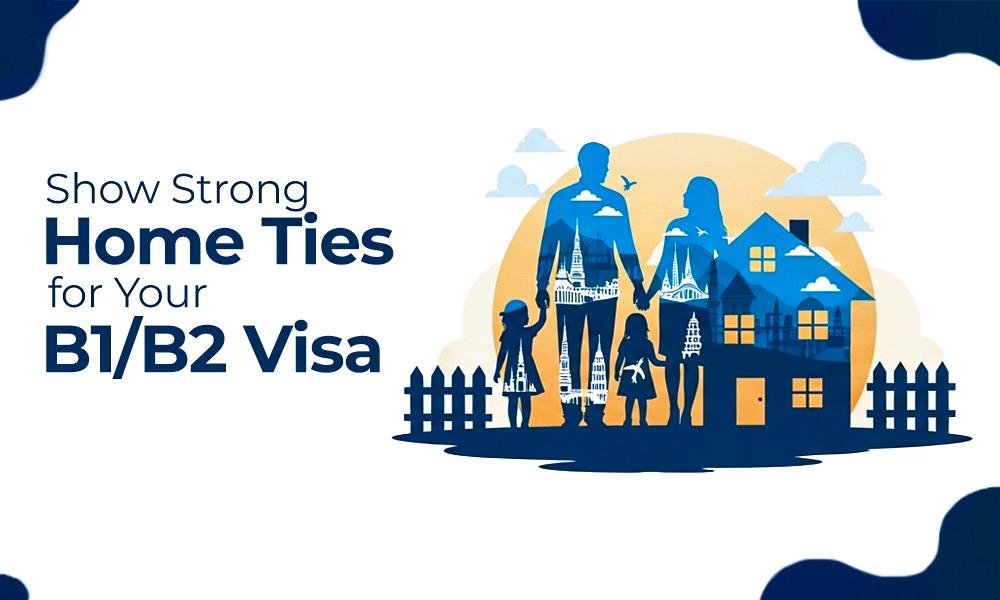Showing strong ties to your home country is one of the most important requirements for a U.S. B1/B2 visa. The consular officer must be convinced that you will return home after your short visit for tourism, business, or family purposes. This write-up explains what strong ties are, why they matter, the types of ties you can show, what documents help, and how to confidently present them during your visa interview.
What Are “Strong Ties” for a B1/B2 Visa?
Strong ties are the personal, financial, professional, and social commitments that connect you to your home country. They demonstrate that you have responsibilities and a stable life you must return to after your U.S. trip.
These ties help prove that you are a genuine temporary visitor and do not intend to overstay your visa in the U.S.
Consular officers assess your entire situation—not one single document. Your story, documents, and answers must be consistent.
Types of Strong Ties You Can Show
Family Ties
Family responsibilities are often the strongest evidence that you will return home.
Examples:
- Spouse and children living in your home country
- Elderly parents depending on you
- Relatives you care for
- Family commitments you cannot leave long-term
Supporting documents:
- Marriage certificate
- Birth certificates of children
- Medical or dependency records (if applicable)
Employment and Professional Ties
A stable job shows you have ongoing responsibilities and a reason to return.
Examples:
- Full-time employment
- Long-term contract
- Supervisor expecting your return
- Business meetings scheduled after your travel
Supporting documents:
- Employment verification letter
- No Objection Certificate (NOC)/leave approval
- Salary statements
- Business license or trade registration (if self-employed)
Financial and Economic Ties
These show that you have an established financial presence at home.
Examples:
- Savings and bank accounts
- Property or land ownership
- Investments
- Running a business
- Regular income sources
Supporting documents:
- Bank statements (last 6 months)
- Property ownership documents
- Tax returns
- Business paperwork
Social and Community Ties
These demonstrate your involvement, commitments, and long-term presence in your community.
Examples:
- University or school enrollment
- Membership in community or religious groups
- Leadership or volunteer roles
- Local commitments and social responsibilities
Supporting documents:
- Enrollment letters or ID cards
- Membership certificates
- Community involvement letters
How These Ties Help Your Visa Case?
Strong ties help in the following ways:
- They reassure the officer that you do not plan to immigrate.
- They show you have responsibilities that require your presence.
- Combined with travel purpose and funds, they support a complete and credible application.
- They help the officer understand your life situation clearly and quickly.
In short, the stronger your ties, the more confident the officer becomes that you will return home before your visa expires.
Documents You Can Carry to the Interview
Although the officer may not always ask for documents, it is important to carry:
- Passport and old passports
- Employment letter and leave approval
- Bank statements
- Business or property documents
- Marriage and birth certificates
- Travel history evidence
- Invitation letter (if you have one)
These documents support your verbal answers and provide clarity if the officer asks.
How to Present Strong Ties during the Interview
Be honest and direct
Short, clear answers work best. Do not over-explain.
Be consistent
Your answers must match your documents and travel purpose.
Show confidence
You don’t need to convince the officer emotionally—just state facts clearly.
Focus on temporary travel
Explain your purpose briefly and highlight your return plan.
Key Takeaways
● Strong ties show that you will return to your home country after visiting the U.S.
● These ties include family, employment, finances, property, study, and community involvement.
● Consular officers look at your overall situation, not just one document.
● Carry supporting documents and answer confidently and truthfully.
● Clear, consistent information helps build trust and improve your chances of approval.
FAQs
1. What is the strongest tie for a B1/B2 visa?
Employment, family responsibilities, and property ownership are usually the strongest ties.
2. Do I need to show all types of ties?
No. You only need to show the ties that genuinely apply to your situation.
3. Will the officer see my documents?
Not always. Many decisions are made based on your answers, but documents help if the officer asks.
4. Can I still qualify if I don’t own property?
Yes. Property is helpful, but stable employment, family, or education ties can also be strong.
5. Can students show strong ties?
Yes. Enrollment documents, class schedules, and academic commitments show strong student ties.
Source:
● U.S. Department of State – Visitor Visa (B1/B2)
● U.S. Department of State – Nonimmigrant Visa Requirements
● U.S. Department of State – Tourism & Visit
● DS-160: Online Nonimmigrant Visa Application

